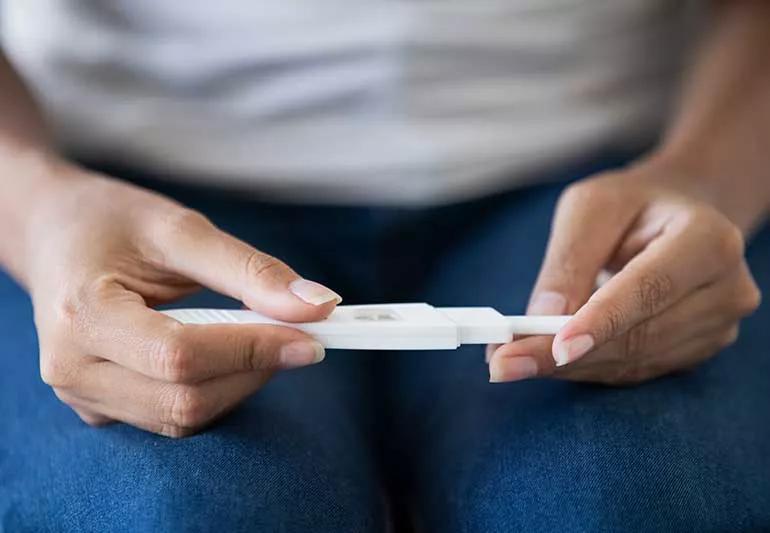No, most hormonal birth control doesn’t affect your future fertility

Image content: This image is available to view online.
View image online (https://assets.clevelandclinic.org/transform/765ed480-0c84-4f9f-8027-80ef0625e1fa/Birth-Control-Fertility-1297131282-770x533-1_jpg)
Woman holding a pregnancy test.
You’ve been using hormonal birth control for years — perhaps decades — and it’s done its job. But now, you’re considering starting or expanding your family. You may be wondering if your birth control will affect your body’s ability to shift into baby-making mode.
Advertisement
Cleveland Clinic is a non-profit academic medical center. Advertising on our site helps support our mission. We do not endorse non-Cleveland Clinic products or services. Policy
Can birth control make you infertile? The short answer is no.
“Using hormonal birth control doesn’t affect your ability to have a baby in the future,” says women’s health specialist Miriam Cremer, MD. So, why is there a myth about birth control causing infertility? Dr. Cremer helps clear the air.
What exactly does it mean to be infertile? Infertility means you’ve been trying to get pregnant for a year but haven’t conceived (gotten pregnant). But that doesn’t mean that you won’t get pregnant.
There are many causes of infertility, such as:
What’s not on the list? Hormonal birth control.
“I talk to a lot of people who worry about this,” Dr. Cremer says. “But hormonal birth control does not affect your fertility.”
Advertisement
It’s possible that being on birth control could hide other health problems that affect your fertility — like irregular periods and symptoms of PCOS and endometriosis. In fact, birth control is often a treatment for those health issues, Dr. Cremer explains.
So, while you’re on the pill (or the patch or the shot, or whatever your hormonal birth control method of choice), it may seem as if everything is in working order. But you might not know if your periods come irregularly or if you have pain from endometriosis until you go off birth control and try to get pregnant.
Hormonal birth control contains one or more hormones. Some methods contain estrogen and progestin while others only contain progestin. Some are short-acting, such as birth control pills. Others are long-acting, such as shots, intrauterine devices (IUDs) and implants.
Hormonal birth control options include:
None of these birth control methods make you infertile or negatively impact your future ability to get pregnant.
“Once the birth control is out of your system, your fertility returns,” Dr. Cremer states.
Once you remove the birth control or stop taking the pill, it takes one to two weeks for the birth control hormones to leave your body. That’s true for every kind of hormonal birth control except for the shot (more on that in a bit). That means you could get pregnant a few weeks after stopping these birth control methods.
With the birth control shot (Depo-Provera), it can take quite a while for your body to start ovulating after your last shot.
“The shots give a large dose of progestin that’s intended to prevent pregnancy for 12 or 13 weeks,” Dr. Cremer explains. “But after stopping the shots, it can take anywhere from three months to over two years for fertility and ovulation to fully return to normal.”
It doesn’t take that long for everyone, she adds, but it’s possible.
An intrauterine device (IUD) is a small T-shaped device your healthcare provider inserts into your uterus. It can stay in place for years, and it’s a very effective form of birth control.
Can an IUD cause infertility?
“This is the one people seem to worry about most,” Dr. Cremer notes. “But as long as your IUD was put in correctly, it shouldn’t lead to fertility problems later.”
Advertisement
In very rare instances, an IUD can become embedded into the tissue of your uterus or cause scarring. But even if this happens and the IUD has to be surgically removed, Dr. Cremer says it’s very unlikely this will lead to infertility.
“The important thing to know is that there are many birth control options,” Dr. Cremer says. “Hormonal birth control especially has come a long way in the past 20 years or so. There’s something that will work for everyone, whether you prefer hormonal or nonhormonal birth control.”
If you have questions about birth control or want to make a switch, your healthcare provider can help.
If you want to have a baby, you’ll have to go off your birth control, of course.
You don’t need to do a special birth control cleanse. And you don’t need to wait any length of time after going off birth control before trying to get pregnant. But it’s a good idea to take some steps to prepare your body for pregnancy.
That includes things like:
When you’re planning to become pregnant is a good time to visit your healthcare provider. Together, you can talk about your health history, medications and anything that might affect your ability to get pregnant and have a healthy pregnancy.
Advertisement
And if you’ve been trying to get pregnant for a year without success (or six months if you’re 35 or older), it’s time for a conversation with your Ob/Gyn. They can talk to you about a range of fertility options to help you get pregnant.
Advertisement

Sign up for our Health Essentials emails for expert guidance on nutrition, fitness, sleep, skin care and more.
Learn more about our editorial process.
Advertisement
Common causes and when to seek help
The field of uterus transplant is advancing
Some couples should see a doctor sooner than others
Certain seizure medications, HIV treatments, antibiotics or herbal supplements can make your oral contraception less effective
‘Safer sex’ means STI prevention, avoiding unintended pregnancies and psychologically safe practices for everyone
Birth control pills with estrogen are best for fighting hormonal acne
Turn to emergency birth control and STI tests
Some birth control can hide perimenopausal symptoms
Type 2 diabetes isn’t inevitable with these dietary changes
Applying a hot or cold compress can help with pain
Pump up your iron intake with foods like tuna, tofu and turkey